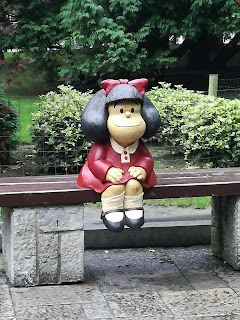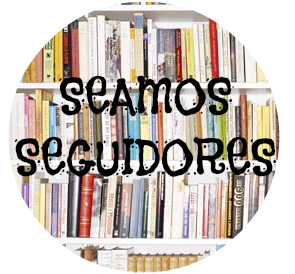Second
year in a row we had an opportunity to participate in book club's
meeting with the laureate of Princess of Asturias Literature Award.
Our trip was paid by the Princess of Asturias Foundation and, same as
in 2016, we spent one day in Oviedo. It actually meant spending many
hours in a bus to be back the same night, but as hard as it was, it
was totally worth the effort.
This time we were 20 people from Renteria, Donostia, Iurreta, Ermua and Leioa. The journey to Oviedo took us about 5 hours. After a quick lunch we had some time to visit the most emblematic places of the city. Mafalda, the cathedral, la Regenta, Woody Allen...
 |
| Mafalda |
 |
| Architect's medieval "signature" on the cathedral |
 |
| Woody Allen |
At 6 we directed our steps to Palacio de Congresos de Oviedo. Over 1,500 participants of different literary groups came from all over the Spain and were trying to get the best places possible. At 7 the door was open for the general public without the individual tickets, which, by the way, had a form of a unique bookmark with a personalized number each.
 |
| A limited edition of bookmark/ticket that all the members of participating book clubs received |
The meeting started on time. Adam Zagajewski was interviewed by Juan Manuel Bonet, the director of the Cervantes Institute and a poet himself. Although most of the topics brought by the interviewer were really serious, Zagajewski managed to sneak in some jokes. Below you can see some of the things the awarded poet commented on (you can find more looking on social media for a hashtag #PoeamasAlVuelo).
 |
| Adam ZAgajewski )on the left) with Juan Manuel Bonet (in the right) |
About
Lviv (natal city):
“
The
loss of the city was a privilege for me as a poet, a treasure”.
The
city of Lviv was up to 1945 a Polish territory, when it was ceded to
the Soviet Union and Polish families had to relocate leaving their
houses behind.
About
Cracow, where he studied:
“It
was a city of my university years. I got there 18 years old from a
small town in a province, which I hated, or pretended to hate. Like
so many others... I embellished it.”
About
travelling:
“I
wouldn't say I was a tourist-poet. I was the accidental traveller. It
wasn't a choice, it wasn't, the majority of it, for pleasure.”
“Houston
is a nice city, but not pretty. It awoken in me kind of mechanism
that rebounced me to Paris. It was an antidote for all that
americanism.”
“In
Paris there were many Polish expatriates, but I was a passerby, a
walker in Paris. You see many nameplates there. <<Chopin lived
here>> <<Mickiewicz lived here>> Paris is scattered
with symbols, with footprints. Chopin, Mickiewicz, Slowacki. Polish
passerby. You never felt lonely.”
About
solitude:
“I
liked solitude a lot. The solitude of my room where I was writing.”
About
politics:
“It
wasn't for me. Long meetings with cigarettes. Cigarettes, smoke and
talking for many hours. But I am a dissident. (…) I adored Michnik.
His sharp sense of humour. He's a friend. Yes, he's a friend of
mine.”
/For
those of you who would like to know more about Adam Michnik, here is
a quote form Wikipedia: <<Michnik became an opponent of
Poland's communist regime at the time of the party's anti-Jewish
purges. He was imprisoned after the 1968 March
Events and
again after the imposition of martial
law in
1981.
Michnik
played a crucial role during the Polish
Round Table Talks,
as a result of which the communists agreed to call elections
in
1989, which were won by Solidarity.
Though he has withdrawn from active politics, he has "maintained
an influential voice through journalism".
He
has received many awards and honors, including the Legion
of Honour and
European
of the Year.
About
Polish poets:
“Milosz,
Szymborska, Rozewicz. Yes, I knew them all. We were friends and they
were splendid people. Witkacy, Bruno Schulz, Witold Gombrowicz were
gods of my youth. Later, I distanced myself a bit from the three of
them, but they are still a necessary reference. They're strange,
almost grotesque.
I'm
afraid literature has lost some of its status nowadays.”
About
music, painting and poetry:
“Music,
painting and poetry form One Art with three different facets. The
music gives the immediate understanding. The painting needs a bit of
translation. The poetry, same as the painting requires an effort,
favourable conditions.”
When
the talk between Zagajewski and Bonet was finished, the public was up
to another surprise: Fernando Beltrán, a poet born in Oviedo but now
set in Madrid, read in Spanish 4 poems personally chosen by their
author, Zagajewski, who also gave us a small recital of the same
titles in Polish.
 |
| Fernando Beltrán (on the left) and Adam Zagajewski (on the right) |
At
the end of the event, quite surprisingly, a few readers managed to
get their books signed by the Polish poet, who seemed equally pleased
and surprised.
 |
| My signed copy of ensayos de Zagajewski |
Try
To Praise the Mutilated World
Try
to praise the mutilated world.
Remember
June’s long days, and wild strawberries, drops of rosé wine.
The
nettles that methodically overgrow
the
abandoned homesteads of exiles.
You
must praise the mutilated world.
You
watched the stylish yachts and ships;
one
of them had a long trip ahead of it,
while
salty oblivion awaited others.
You’ve
seen the refugees going nowhere,
you’ve
heard the executioners sing joyfully.
You
should praise the mutilated world.
Remember
the moments when we were together
in
a white room and the curtain fluttered.
Return
in thought to the concert where music flared.
You
gathered acorns in the park in autumn
and
leaves eddied over the earth’s scars.
Praise
the mutilated world
and
the grey feather a thrush lost,
and
the gentle light that strays and vanishes
and
returns.
(translated
by Clare Cavanagh)














A wonderful and a fresh cronicle. Thank you Slawka.
ResponderEliminarThanks for reading :)
Eliminar